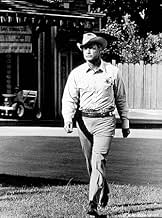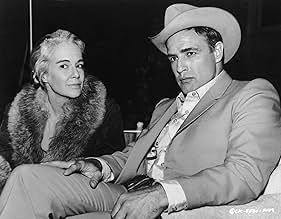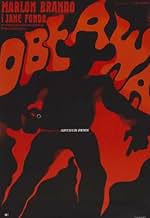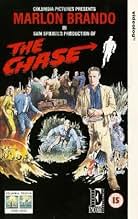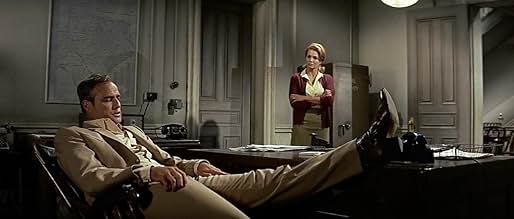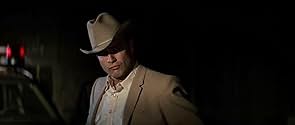IMDb रेटिंग
7.1/10
15 हज़ार
आपकी रेटिंग
बबर रीव्स के जेल से भागने का छोटे दक्षिणी कस्बे के लोगों पर बहुत असर पड़ता है.बबर रीव्स के जेल से भागने का छोटे दक्षिणी कस्बे के लोगों पर बहुत असर पड़ता है.बबर रीव्स के जेल से भागने का छोटे दक्षिणी कस्बे के लोगों पर बहुत असर पड़ता है.
- पुरस्कार
- कुल 1 जीत
Marc Seaton
- Paul
- (as Marc Skaton)
फ़ीचर्ड समीक्षाएं
The Chase (1966)
I give this movie extra credit for ambition, and for richness of story and complexity. It's a torrid soap opera overall, which is a good thing because it is saved by its romanticized excesses. The title is odd, in a way, because the obvious "chase" here is the pursuit of the convict on the run (played by Robert Redford, and not his best performance). But in a way there are all kinds of other chases here—women and men wanting each other with a whole network of adultery and would-be affairs at play.
But never quite shown. This is a movie pushing the end of the censorship code, but the code is still officially in place and so there are still some boundaries, even for a director like Arthur Penn, who would help New Hollywood blossom (notably with "Bonnie and Clyde" the next year). But the steamy background as this small town wrestles with decency, among other things, is great stuff.
Decency, as a core idea, is what the main character is all about—the sheriff played by Marlon Brando. Brando is great. He isn't quite the Texas sheriff intended, of course (he's "Brando"), but he has nuance and strength, and he helps his scenes a lot. But the movie is brimming with talent: Robert Duvall, for one. Two women do their parts—Jane Fonda and Angie Dickinson—though neither is given enough to do besides support their male counterparts (Fonda is a kind of "loose woman" and Dickinson is a girlfriend having affairs).
But Penn is the biggest talent, pulling together a very complicated story in two hours. Photographer Joseph LaShelle is great, too, one of the masters of early widescreen color in the US. Together they make this movie fluid, beautiful, and constantly demanding in the best way.
What holds it back is a little of the superficiality that is so common in early 60s films—it's about sensation and effect, about drama for its own sake. You never quite care about Redford in his run (he's a surprisingly small part of the movie until the end). And even all the other characters working out their prejudices are a bit on the surface.
There is a welcome racial theme here, and a generational one (young people utterly selfish and party hungry in this version, and older folk filled with prejudice and greed). I say see this film. There's a lot going on, and I could watch it a second time just for everything I missed.
I give this movie extra credit for ambition, and for richness of story and complexity. It's a torrid soap opera overall, which is a good thing because it is saved by its romanticized excesses. The title is odd, in a way, because the obvious "chase" here is the pursuit of the convict on the run (played by Robert Redford, and not his best performance). But in a way there are all kinds of other chases here—women and men wanting each other with a whole network of adultery and would-be affairs at play.
But never quite shown. This is a movie pushing the end of the censorship code, but the code is still officially in place and so there are still some boundaries, even for a director like Arthur Penn, who would help New Hollywood blossom (notably with "Bonnie and Clyde" the next year). But the steamy background as this small town wrestles with decency, among other things, is great stuff.
Decency, as a core idea, is what the main character is all about—the sheriff played by Marlon Brando. Brando is great. He isn't quite the Texas sheriff intended, of course (he's "Brando"), but he has nuance and strength, and he helps his scenes a lot. But the movie is brimming with talent: Robert Duvall, for one. Two women do their parts—Jane Fonda and Angie Dickinson—though neither is given enough to do besides support their male counterparts (Fonda is a kind of "loose woman" and Dickinson is a girlfriend having affairs).
But Penn is the biggest talent, pulling together a very complicated story in two hours. Photographer Joseph LaShelle is great, too, one of the masters of early widescreen color in the US. Together they make this movie fluid, beautiful, and constantly demanding in the best way.
What holds it back is a little of the superficiality that is so common in early 60s films—it's about sensation and effect, about drama for its own sake. You never quite care about Redford in his run (he's a surprisingly small part of the movie until the end). And even all the other characters working out their prejudices are a bit on the surface.
There is a welcome racial theme here, and a generational one (young people utterly selfish and party hungry in this version, and older folk filled with prejudice and greed). I say see this film. There's a lot going on, and I could watch it a second time just for everything I missed.
Much sexual water has gone under the bridge since the 1960s, and more than a few installments of "The Playboy Philosophy." So now, at the millennium's turning, a tale in which the prejudices, cynicism and sexual infidelities of a small southern town's dissolute ruling class figure prominently seems dated, even quaint. Yet such is the terrifyingly plausible spiral into anarchy depicted in 1966's The Chase that Arthur Penn's controversial film remains a disturbing piece of cinema. A thinner (but still imposing) Marlon Brando plays Sherrif Calder, a lone, laconic voice of reason in a town rapidly going insane on a hot summer's night. E.G. Marshall is Val Rogers, bank president and town monarch, suitably surrounded by fawning lackeys such as Ed Stewart (Robert Duvall, uncharacteristically loathsome as a milquetoast cuckold aching for revenge). The spark for the climactic firestorm is the return of "Bubba" Reeves, who has escaped from prison after being sent away for joy-riding in a stolen airplane. Everyone assumes he is coming back to avenge himself on Rogers' son, who has been keeping company with Reeves' wife Anna (Jane Fonda). The film's weakest performance is, arguably, turned in by Robert Redford, who is much too pretty and soft-spoken to be convincing as the fugitive hellion, Bubba. Overall, however, The Chase features some memorable performances, including those of Brando, Duvall and Janice Rule as Duvall's slutty wife, Emily. In addition to the fearsome inevitability of its violence, The Chase is notable for the horrific realism of the beating inflicted on the sherrif by a couple of corporate good 'ol boys - almost certainly the most graphic beating Hollywood had ever dared to put on film, and possibly unrivalled to this day for its sheer ferocity. Critics may have made much of the film's flaws, but as a study of a dysfunctional society poised to explode, The Chase still stands up as a sobering and powerful movie experience.
I had never heard about The Chase. Rented it from the local library, since it starred Marlon Brando and Robert Redford. Just watched it this morning. It blew me away. Without a doubt it is the best movie I have seen in 2009, and one of the movies to remember.
It does have some problems with editing and music at the outset and feels oddly paced in the first half hour, but when it finds its tone and picks up the pace, it's a true roller coaster ride of emotions.
The characters are archetypes, and the story aims more for dramatic effect than realism.
Brando is fine as the honest Sheriff, and Dickinson puts in excellent performance as his supportive wife. Redford is the outlaw on the run as an escape convict, even though he seems to be one of the most decent people around. Jane Fonda is his wife, who has fallen in love with the town's prince, played by James Fox who is on his own parallel escape from his father's (E.G. Marshall) money and materialism. Robert Duvall also gives a nice little supporting performance.
The villain is mob behavior, corruption, and a society that looks for pure pleasure instead of some sense and meaning. Honest and decent people are on the run from society's destructive tendencies, and the only one to protect the innocence of society is a single Sheriff, who does everything in his power to protect the law that nobody respects but himself.
Perhaps I am giving The Chase such a high rating partly because I had never heard about it before, and was completely blown away. It contains a lot of complex characters, and feels in the opening more like a play than a movie, but if you give it a chance, you may be pleasantly surprised.
I think it should belong to the Western genre, even though it takes place in the 60's. It got guys in cowboy hats, an outlaw, a sheriff, a rich man that is taking over everything, some romance, bystanders that aren't very innocent, and a wild bunch that happens to hide within a very disturbed society.
Highly recommended.
It does have some problems with editing and music at the outset and feels oddly paced in the first half hour, but when it finds its tone and picks up the pace, it's a true roller coaster ride of emotions.
The characters are archetypes, and the story aims more for dramatic effect than realism.
Brando is fine as the honest Sheriff, and Dickinson puts in excellent performance as his supportive wife. Redford is the outlaw on the run as an escape convict, even though he seems to be one of the most decent people around. Jane Fonda is his wife, who has fallen in love with the town's prince, played by James Fox who is on his own parallel escape from his father's (E.G. Marshall) money and materialism. Robert Duvall also gives a nice little supporting performance.
The villain is mob behavior, corruption, and a society that looks for pure pleasure instead of some sense and meaning. Honest and decent people are on the run from society's destructive tendencies, and the only one to protect the innocence of society is a single Sheriff, who does everything in his power to protect the law that nobody respects but himself.
Perhaps I am giving The Chase such a high rating partly because I had never heard about it before, and was completely blown away. It contains a lot of complex characters, and feels in the opening more like a play than a movie, but if you give it a chance, you may be pleasantly surprised.
I think it should belong to the Western genre, even though it takes place in the 60's. It got guys in cowboy hats, an outlaw, a sheriff, a rich man that is taking over everything, some romance, bystanders that aren't very innocent, and a wild bunch that happens to hide within a very disturbed society.
Highly recommended.
The lukewarm reviews and comments led me to expect less than what I found in this decent movie of small-town corruption. Most of it is probably due to a pretty good cast - Brando is excellent, and Duvall, Dickinson, and E.G.Marshall put in good work. Redford's part is too small to do much with. I too was astounded at James Fox's pretty darn good Southern accent; it was so good that at first I couldn't place him, and then all those British roles came back to me in surprise. The script is ok too, and one would like to know more about the backstage fighting that went on over it between Hellman & company. The Panavision color is excellent; far better than what we have today. The portrayal of small-town bigotry, duplicity, jealousy, betrayal, and infidelity is well-done, and the spectacular junkyard Gotterdamerung is a chilling finale. The flick is definitely worth seeing.
A town in the southern United States is presented as a kind of microcosm in which hypocrisy, class struggle, lust, the cult of power and money, jealousy, but also dignity, common to all societies, coexist. As the minutes go by, the townspeople become increasingly brutalized and debased, on a Saturday night that will end in tragedy. Robert Reford's character is a born loser, who has escaped from prison and returns to the only place he knows, his hometown, where his wife Jane Fonda lives, or his parents, rude people who have not given him the affection necessary to make him a worthwhile man. Marlon Brandon and his spouse Angie Dickinson, they are without a doubt the most humane couple in that 'wretched' town. The direction is sublime, with no concessions to any kind of unneeded 'joy'.
क्या आपको पता है
- ट्रिवियाMarlon Brando did not like the part of Sheriff Calder and complained that all he did in the picture was wander around. He began referring to himself as "The Old Lamplighter".
- गूफ़Every locomotive seen in railroad scenes is diesel powered, but all sounds are from steam locomotive whistles. Diesels use horns, not whistles.
- भाव
Damon: Well now, Sheriff, it's nice to know that you're out here on patrol.
Sheriff Calder: No, no, I'm not on patrol. Just lookin' for an ice cream cone, that's all.
- कनेक्शनEdited into The Old Man & the Gun (2018)
- साउंडट्रैकOne Day Soon
टॉप पसंद
रेटिंग देने के लिए साइन-इन करें और वैयक्तिकृत सुझावों के लिए वॉचलिस्ट करें
- How long is The Chase?Alexa द्वारा संचालित
विवरण
बॉक्स ऑफ़िस
- US और कनाडा में सकल
- $50,00,000
- चलने की अवधि2 घंटे 14 मिनट
- रंग
- पक्ष अनुपात
- 2.35 : 1
इस पेज में योगदान दें
किसी बदलाव का सुझाव दें या अनुपलब्ध कॉन्टेंट जोड़ें



